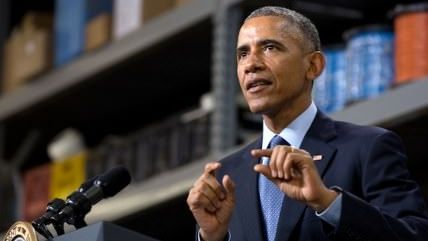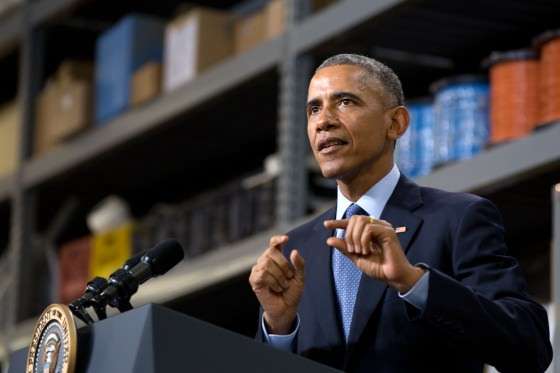Government-Subsidized Broadband? Could Obama Define 'Necessity' Down Any Further?
The president addresses a country that currently hates his political party by offering more big government.


Free community college! Federally mandated sick leave! Government-subsidized broadband! President Barack Obama appears to be trying to not go out like a lame duck by demanding all sorts of big government pushes, despite the pounding his party took in the midterms. These are all parts of a "preview" of his plans to be introduced in next week's State of the Union Address. Since the public has no intention of watching it, there's no reason not to spoil his own presentation. (Maybe he should take it a step further and cancel the whole dog and pony show entirely.)
We've already turned a skeptical eye to the community college proposal here.
The federally mandated sick leave program was pushed out by White House Adviser Valerie Jarrett on employment-oriented social media platform LinkedIn (no, really) with the headline "Why We Think Paid Leave Is a Worker's Right, Not a Privilege." Being paid for not working is self-evidently not a right but something that can be negotiated with employers, but never mind that. Jarrett argues that it will help bring in better talent and increase employee productivity, which is why a lot of places already do offer medical leave. The some-odd 40 million workers who don't have medical leave tend to work low-skilled jobs at restaurants, retailers, and hotels. These places aren't looking for "talent" so much as they're looking for bodies who can perform basic tasks and be reliable. It may feel cruel to not pay people already living on low wages because they're sick, but there's no such thing as free sick days, and just as with forced increases to the minimum wage, there will be significant costs involved that will ultimately result in fewer of these jobs available. You don't get paid sick leave when you're unemployed.
And then there's the broadband proposal. Despite the private telecommunications market working to improve Internet speeds for consumers already, the president wants to encourage municipal governments to wade in and compete with them and spend huge amounts of tax dollars to turn Internet access into a public utility. In a speech in Cedar Falls, Iowa, which built its own broadband network, he called for the Federal Communications Commission to find a way to stop states from prohibiting cities from building their own municipal Internet services. He asserted that broadband access is a "necessity," not a luxury, apparently on the basis of it being really, really useful.
But Obama and the White House demonstrates little understanding of what is keeping cities from having faster Internet already. He has confused the problem with the solution. Here's TechFreedom President Berin Szoka to explain:
The greatest regulatory barriers to deployment are local, not Federal: Cities make it painfully difficult to deploy new infrastructure. Google Fiber's great accomplishment is convincing cities to get out of the way. Yet the White House focuses entirely on cities as the solution — not by cutting red tape, but by building their own networks to compete with private providers. That means taxpayer dollars that should go to pay teachers and fix potholes, are instead squandered on inefficient and expensive networks. Governments, unlike private companies, can simply borrow and throw money at broadband projects until they "work," leaving taxpayers on the hook.
Provo, Utah, sunk $39 million into a fiber network before realizing that it wasn't very good at running it — and selling the network to Google for $1. Instead of wasting taxpayer dollars on things private capital will do if given the chance, cities should make deployment easy while investing in fiber-ready infrastructure.
Szoka also notes that Google Fiber's private service in Kansas City and Austin, Texas, is cheaper than what is offered in Cedar Falls.
I've noted before that the FCC is raring to introduce more taxes to subsidize broadband network construction across the country, using the argument that whatever Internet connections existed simply weren't as fast as the government thought they should be. Much as the president's proposal for free community college tuition would serve college administrators more than it would students (given that community college is already very accessible), the president's broadband plan is really more about creating more government jobs and projects, not actually providing needed services the private marketplace is unable to address now.


Show Comments (135)